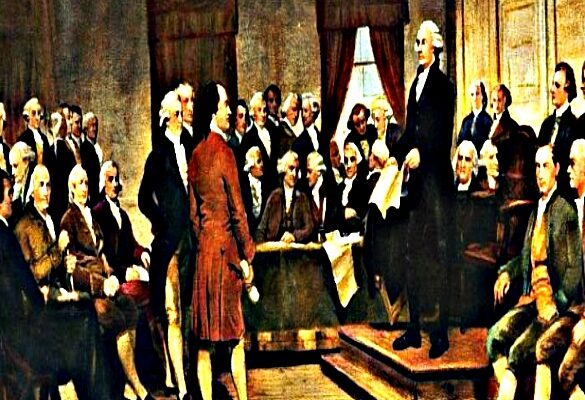What you are about to read beneath the fold is my Aug. 20, 2010 letter to now deceased (RIP, sir) Senator Tom Coburn (R. OK) one day after my son and I had attended his “TownHall” meeting in McAlester, OK along with approx. 100 other attendees. Not only did I send the letter to Senator Coburn’s Washington D.C. office via email, but I also posted it as an article that same day at my old blog, D. Webster’s Blogspot, here.
Keep in mind as you read that I was appealing to a few of Senator Coburn’s own biases in my letter, thereby attempting to subtly lead him out of the “error of his ways,” and closer to a correct interpretation of the U.S. Constitution as written. E.g. When I spoke in the first paragraph of the Constitutional Crisis that we were facing and its remedy, I was speaking to Senator Coburn’s sense of crisis he had revealed in his presentation to the group only a few minutes before I nabbed him in a hallway on his way out of the building. One thing Senator Coburn kept reiterating throughout his presentation was that, in his words, ‘we have about fifteen years left before this all collapses around us if we don’t do something now.’ That was twelve and a half years ago, so…
Our little meeting only lasted about ten minutes tops, which was all the time I needed to say to Senator Coburn what I had to say to him. I also had every intention to write to him about our conversation via email while the subject matter of our face-to-face conversation was still fresh to his mind. Also, keep in mind that our State’s immigration restriction bill had, only a few weeks before, been handed back to our legislature stripped of its muscle and sinews. What the 10th Circuit Court of Appeals told our legislators and the People of Oklahoma, as well as the legislatures and the People of surrounding States under that Court’s jurisdiction, is essentially that, ‘you may write, pass and enforce any legislation you like concerning illegal immigrants coming to or residing in your State; but what you may not do is interpret the Constitution correctly within the provisions of the law. So let it be written, so let it be done.’ You see, folks, “the appearance of the law must be upheld, especially when it’s being violated.”
Our legislature did its duty and appealed the 10th Circuit’s decision in that case, but a lot of us, including yours truly, knew way ahead of time that nothing would come of that appeals process. Noteworthy about the “Amendment Proposal” I wrote and introduced to Senator Coburn as an attachment to the letter, is that its sections deal with and contain all of the “muscle and sinew” of our State’s immigration law that the 10th Circuit Court of Appeals had just extracted from it, handing us back the bare bones of a piece of legislation worth about as much, and able to stand on its own, as the paper it is written on.
I have copied and pasted the letter below as it was originally written, but have added a note below it, along with several links that did not appear in the original blog post for your further edification. There is no “constitutional remedy” to our situation at this date nor going forward; whether or not there was when I wrote that letter offering one to Senator Coburn is a debatable question, but I highly doubt it with the 20/20 vision hindsight, and additional wisdom gained, affords me. Anyway, I don’t wish for the introduction to go overly long, so, without further ado:
Dear Senator,
Amending the constitution is supposed to be the Peoples’ last resort method of solving serious constitutional issues before they become crises. A constitutional crisis exists whenever any part of the government simply ignores its provisions or refuses to obey them. Federal law does not necessarily trump State and local law regardless of whether the Congress “occupies a field,” and “intends a complete ouster.” And tacit acquiescence only matters while States are willing to simply “go along.” That is, if the constitution still means anything outside modern interpretation of the fourteenth amendment.
I personally find only one thing in the fourteenth amendment objectionable to myself. Namely the phrase [*]“subject to the jurisdiction thereof.” By this phrase every other constitutional principle preceding it is effectively declared null and void, with the possible exception of the thirteenth amendment. We still have the original constitution but its principles only mean something in context of the fourteenth amendment citizenship provisions. What portions of it that we still observe in American politics and outside that context are only done as a matter of convenience to the central government. If or whenever it decides to usurp State and local authority in those matters, it will do so through the federal courts via the fourteenth amendment citizenship clauses. Count on it. This is the way things are and have been done for many decades in American politics. And it will not change until an explicit and authentic act of the whole People alters the way the game is played because liberalism dominates our politics whether we like it or not.
Therefore, my idea for amending the constitution to clarify the intent of the fourteenth amendment is far from being the “stupid idea” you said it was when I mentioned it to you this past Thursday in McAlester. Closing the borders is all well and good and I certainly agree that that needs to be done. But has the loudness of our declamations resulted in sealing the borders? Has it stopped this talk about granting amnesty to the tens of millions of illegal immigrants already here? Has it forced attrition on any of them as yet? Has it done anything to solve this “birthright citizenship” for children of illegal immigrants issue? Keep in mind also that I’m not proposing repeal of the fourteenth amendment, only clarification of its intent for our generations.
But there’s a much bigger underlying principle you seem to be missing in all of this debate over State immigration laws, and etc. Ultimately it’s not about whether the federal government has neglected in the past, or will continue to neglect in the future, its responsibility to protect our borders. No; what this is all about at bottom is that the constitution reserves to the States and to the local governments power to control or regulate a host of items within their own borders, without federal intervention and at their own discretion. Immigration is one of these reserved powers. Several States, including Oklahoma and Arizona, have made worthy attempts in recent years at exercising their discretion in this immigration matter, but to no avail. Simply stated, their most effective efforts have been railroaded by the federal courts who invariably cite the fourteenth amendment citizenship and equal protection clauses as their just cause for usurping the rest of the constitution. This method cannot be allowed to continue much longer or our fate as a nation is already sealed. And if you think you can get the federal courts out of the business of doing this short of amending the constitution to prevent it, well, I think you’re very naïve about the power of the federal courts and the ability of anyone to pressure them into anything they don’t want to do. As long as the fourteenth amendment exists as the courts have interpreted it, and without clarification from the People, the federal judiciary is going to continue following this pathway of establishing an absolute federal tyranny over these States.
The personality that I am will not allow me to simply complain about a thing without offering a viable alternative to it. Below is my attempt at solving this veritable constitutional crisis before it gets out of hand (it may well already be out of hand) and we’re forced into a situation that none of us wants:
A proposal to amend the U.S. Constitution to transform the meaning of the fourteenth amendment back to its original intent; to end government by judiciary; to reinvigorate the principles of the constitution as written; to reintroduce the doctrine of reserved powers and to end the practice of admitting to the rights of citizenship at birth persons born in the United States to foreigners illegally residing therein. We introduce this amendment proposal as a means to form a more perfect union, establish justice, ensure domestic tranquility, provide for the common defense, and to secure the blessings of liberty to ourselves and our posterity.:
Section 1: The fourteenth amendment to this constitution shall not be construed by the United States or by any State to admit to the rights of citizenship, or subject them to their jurisdiction, children born to immigrant parents illegally residing within the United States, or subject to a foreign state, at the time of their birth. Persons born in the United States to alien parents temporarily and legally residing therein shall be subject to all terms and conditions, privileges and immunities, expressly provided for in their parents’ visas and the laws of the States wherein they reside. The United States retains the power to establish an uniform rule of naturalization, but no State shall be compelled by the United States to admit to the rights of citizenship, nor subject them to their jurisdiction, any person or persons involuntarily.
Section 2: No State shall be compelled to house, harbor, educate, provide food or medical services, grant safe passage to or otherwise assist immigrants illegally residing within its borders, nor to conform its laws affecting such residents to the laws of the United States except those made pursuant to the constitution and this article. The exercise of Powers reserved by the constitution to the States or to the People shall be left to their discretion. No reserved power shall transfer to the United States except by process of amendment, but the United States may exercise reserved powers upon application to and express consent of the legislature of the States wherein they propose to exercise them.
Section 3: The Congress is hereby suspended for the term of twenty years from further enacting laws affecting immigrants to the United States or to any State, and no form of amnesty for illegal immigrants shall be granted or recognized during the term of suspension. No State shall be compelled by existing U.S. law to receive immigrants of any race, color, nationality or kinship.
Section 4: Congress shall have power to enforce the terms of this article by appropriate legislation, but no construction of its provisions, or of the provisions of any other article of the constitution which shall be effective at the time of its adoption, shall ever be effective to establishing unconditional federal supremacy in law making, nor shall the provisions of this article affect the citizenship of persons born or naturalized within the United States prior to its adoption.
Section 5: The terms and conditions of this article are hereby exempted from judicial review.
While I certainly understand that issues will be raised with this proposal as written, it forms a good workable model for ending judicial and federal tyranny via the fourteenth amendment in our generation. We owe it to our children and grandchildren to leave them a free and balanced constitutional government to work with. What they do with it from there is, of course, up to them.
As I’ve barely skimmed the surface of how the federal government abuses the fourteenth amendment citizenship provisions to its own purposes, please engage me in further discussion on this matter at your convenience.
Respectfully,
Terry D. Morris Jr.
McAlester, OK
[*] The so called “federal government” actually obeys the “and subject to the jurisdiction thereof” stipulation of the first section of the 14th Amendment citizenship clause, although not in a way you might think, and certainly not in a way that has ever occurred to the likes of Eric Foner, et al. It obeys the provision through its “enrollment at birth” Social Security program, ensuring thereby that all children, or virtually all children, born in an American hospital become subject to full U.S. jurisdiction at birth, regardless of the citizenship status of their parents. This is also a convenient and highly effective way of simplifying and expediting the naturalization of their parents, thereby giving them full U.S. citizenship privileges and immunities, etc. That is why we call their American-born children “anchor babies.”




Section 3 is the linchpin, without that, all proposals are doomed.
I believe RC Sproul once asked Judge Robert Bork( God rest his soul) if he was still
teaching Constitutional law, to which Bork replied, that there was no need since we no longer had one( paraphrasing) .
Thanks for your tenacity in trying to change the status quo.
Thank you, brother. You wrote:
Quite. I’m pretty sure it was R.C. Sproul who once told the story in one of his sermons of when he and his wife attended a teacher-parent conference for one of their grandchildren in the absence of the child’s parents (the parents were on some business trip or something, as I recall). After the teacher had told the group about all the new innovations they were doing with the kids in the school, Dr. Sproul spoke up and asked something to the effect of, ‘exactly what is the goal with all of this?’ The teacher ultimately couldn’t answer the question satisfactorily – ‘she had no idea what the goal was, but she was neverthess onboard with it 100%’; Sproul said at that point in the sermon that it is impossible for me to convey to you how mortified I was by this revelation and what it portended for the students of that school and their futures.
I can remember when it finally dawned on me that all those years of intellectual work I’d poured into understanding the U.S. Constitution and how to properly interpret its provisions according to the original intent of the founders, as well as how to properly interpret the original intent of the framers of the fourteenth amendment, etc., was all essentially for naught; inasfar at least as teaching others so has a chance in hell of changing their opinions on the matters at hand. So, yes, I can definitely relate to what Dr. Sproul was feeling when he got the answer he did from that teacher, as well as Mr. Bork’s attitude about teaching Constitutional law towards the end of his career.
One thing I think I learned from it all, however, is that when one is heavily invested in a proposition, or a given set of propositions, (s)he will not give it/them up easily, even when her arguments are proven as wrong as an argument stating that the sun rises in the west and sets in the east. …
Thanks for the comment, sir.